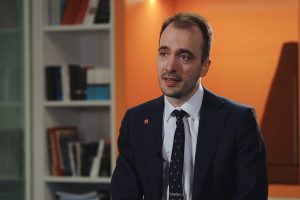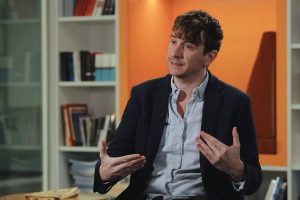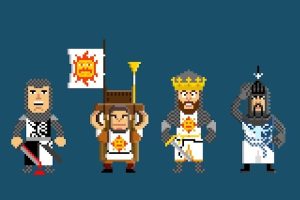Liberal Arts Curriculum
Daniel Kontowski on the freedom of students, prescribed curriculum and a ‘cafeteria’ model of education
What is liberal arts education? That’s a very good question because people who used to write about liberal arts education do not really agree with each other, and when you read what they are saying side by side, they are talking about something, and it’s clear that they care about this stuff, but this stuff is not the same for each of them. I think I agree with my former supervisor, Thomas Norgaard, who believes that there is only a reason to talk about liberal arts education if it is somehow connected to freedom. That means that it’s either for the people who are free, or it expresses the freedom of those people, or that it makes a person who is not free suddenly free. But this is a kind of philosophical understanding that can be used for some divisions between whether you are talking about a real example of liberal arts education or a fake one, or an abuse of the concept, but it doesn’t really tell us, when you look at the program, whether this program fits that. It’s a matter of judgment rather than internal construction of the program.
Historians who have been working on liberal arts education as a topic, an idea that has changed throughout history, do not agree with each other as well.
For example, Bruce Kimball has written a book called Orators and Philosophers about the split from the very start of liberal arts education in the ancient Greece, the split between the orators who believed that liberal education, yes, it is for the free people to develop logos in the sense of speech, in the sense of their rhetorical skills, in the sense of their ability to convey a message to a community, whereas philosophers were saying, liberal education is about logos but in a different sense, in the sense of reason, in the sense of permanent and never-ending pursuit of truth.
There were many differences between those two groups, and the whole confusion, Kimball argues, about what liberal arts education means goes back to ancient Greece and to this ambiguity in the essential early-on meaning.
But, for example, Sheldon Rothblatt does not really agree with Kimball’s reconstruction. He believes that it’s too simplistic because, actually, there were more than two, and they are not so evenly split that you can just tell the whole story by saying those were understanding in this way and those in the other way. He’s saying there were at least six different themes of liberal education, and at certain points, there could have been more than one theme that people believed in.
A lot of those themes have actually been developed very recently. For example, the idea of critical thinking was not there for the liberal education in ancient Greece, not in the sense that we presume right now because it’s connected to certain skills required in modern democracy: there were no modern democracies in ancient Greece. On the other hand, for example, the idea of a holistic character formation, the idea that a person should be a well-rounded citizen who is prepared to have a conversation on a range of topics and understand their place in the world, in society and in their mind, this idea goes back to the Greeks for sure.
To take a modern example: last year, the Association of American Colleges and Universities, which is the biggest voice defending liberal education in the US, issued a new definition of liberal education. They used to have one for the past seven years, and they decided it’s no longer reflective of what liberal education is and how it should be described to society. Right now, they are saying it’s all about integration; it is about the integration of what’s happening in the curriculum with what’s happening, as they say, co-curriculum, which we would understand as what’s happening on campus, what the students are doing beyond their classes. It’s per se a concept that is not easily translatable to countries where there is no idea of a campus in that sense, no expectation of campus at least; that it’s an integration between the academic and experiential, so between learning courses for the sake of learning through acquiring knowledge and skills, and courses in which an important component of learning is an application, is doing stuff with your hands, it understands how things work in real life, not in the classroom, so this type of integration.
Lastly, the AAC&U also argues that there are at least three different sets of learning outcomes that are specific to a contemporary liberal arts education. A person who graduates with a degree in business won’t have particular competencies that a person who graduates from a liberal arts institution will have. One of them pertains to the word of work, and they argue that there are certain qualities of mind or skills that can be transferable between different contexts that are developed well in the context of the liberal arts education but not in the other ones.
Here we have a strong tension with what I started from: the idea of being a free person, because for the Greeks a free person is somebody who is not working, who will never work and their education is not here to be more efficient, faster employee on the market, it’s not even the idea of becoming more effective businessman: it is an idea that this is an education for your free time, not for doing something in your main life because in your main life you are just not earning money.
Secondly, they argue that the liberal arts education has certain learning outcomes that pertain to the world of citizenship and that it has qualities that make you a good citizen of modern society, although we will disagree on what those things are. But there are certain skills, for example, tolerance, understanding of different perspectives, and critical thinking, all that make you a better citizen.
Lastly, there is the idea that liberal arts education doesn’t prepare you just for the next 5-10 years of your life; it prepares you for the whole of your life — learning how to become fulfilled, learning stuff that will make you happy for the longer term, learning things that will be useful for you not for any particular line of engagement but to kind of creating a complete human being. There is this type of idea about a learning outcome specific to liberal arts education as well.
My problem with this definition is that it is not specific in the sense of where we can find this liberal arts education or how we should know when we look at something that is called liberal education, whether that’s happening or not. By this definition, liberal education can happen at any level of education, it can happen in any type of institution, it can happen in any language, it can happen in a range of ways, and as long as somebody is claiming that this is what they are doing, there is never a way to say whether they have an implementation problem, so they mean well, but it’s just not working, or maybe the whole idea is wrong.
In my research, I spoke to the first leaders who created programs in eight European countries when there were none, and I came to the conclusion that they all didn’t agree about the model; they didn’t agree about the meaning or some kind of interpretation about the liberal arts education. But what all of them were thinking when they were saying they were for liberal arts education were three things. One of them was ontological complexity: they wanted an education that reflects the fact that the world is complex not at the rhetorical level but actually in the curriculum and in the approach to the matters that you are learning. That means that you need to develop the breadth not just to satisfy the needs of your different departments but you need to develop because, without it, you’re not going to graduate educated people.
Secondly, they all believed in transformative pedagogy, which means that basically you don’t achieve learning outcomes, or rather it is impossible to predict what the learning outcomes are going to be, and there is a very good chance that what the student tells you when they are 19 they want to become, it’s not good for them, and it’s not going to happen. The point of liberal education is to transform those perceptions.
The point of the liberal education has always been to shape a human being into something that they are not yet.
I think this is an ambitious model of education that is very difficult to square with the consumerist approach in which you will already know what your set of preferences is. You compare institutions to figure out which will give you that in the cheapest possible way.
Lastly, I think all real liberal education institutions have to be examples of your organizational alternative which changes over time and is different between different countries, sometimes even between different universities. I think liberal education is a calling; this is an idea that is not specific, but it is an idea that motivates people to invent something new. The history of liberal education is a history of those inventions; it’s a history of reactions to whatever universities have become and what we can do about that. Many people were using the prestigious tradition of liberal arts education, prestigious and confusing as it is, to convey some kind of authority to new developments and innovations that were happening. I believe that the liberal arts institution today and especially tomorrow has to be different from what regular universities are, and it has to eventually be different from other liberal arts education institutions because it has to reinvent what the liberal arts education is. This is just a source that we are using to think about what education should be and how to become a fuller, more complete human being.

Daniel Kontowski on the freedom of students, prescribed curriculum and a ‘cafeteria’ model of education

Historian Peter Jones on the first European universities, different models of the education regulation and the...

Professor of French and Medieval Studies Norris Lacy on the evolution of Arthurian legend, the Grail Quest, an...